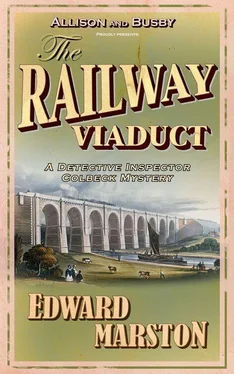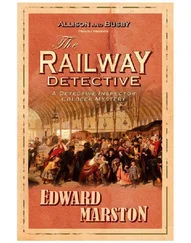Edward Marston - The railway viaduct
Здесь есть возможность читать онлайн «Edward Marston - The railway viaduct» весь текст электронной книги совершенно бесплатно (целиком полную версию без сокращений). В некоторых случаях можно слушать аудио, скачать через торрент в формате fb2 и присутствует краткое содержание. Жанр: Классический детектив, на английском языке. Описание произведения, (предисловие) а так же отзывы посетителей доступны на портале библиотеки ЛибКат.
- Название:The railway viaduct
- Автор:
- Жанр:
- Год:неизвестен
- ISBN:нет данных
- Рейтинг книги:3 / 5. Голосов: 1
-
Избранное:Добавить в избранное
- Отзывы:
-
Ваша оценка:
- 60
- 1
- 2
- 3
- 4
- 5
The railway viaduct: краткое содержание, описание и аннотация
Предлагаем к чтению аннотацию, описание, краткое содержание или предисловие (зависит от того, что написал сам автор книги «The railway viaduct»). Если вы не нашли необходимую информацию о книге — напишите в комментариях, мы постараемся отыскать её.
The railway viaduct — читать онлайн бесплатно полную книгу (весь текст) целиком
Ниже представлен текст книги, разбитый по страницам. Система сохранения места последней прочитанной страницы, позволяет с удобством читать онлайн бесплатно книгу «The railway viaduct», без необходимости каждый раз заново искать на чём Вы остановились. Поставьте закладку, и сможете в любой момент перейти на страницу, на которой закончили чтение.
Интервал:
Закладка:
'You're a man who is wilfully concealing evidence from the police, sir, and that is a criminal offence. If you will not come with me voluntarily, I will have to arrest you.'
'But I have no evidence.'
'That's for me to decide.'
'This is disgraceful. I shall complain to the commissioner.'
Colbeck opened the door. 'I'll make sure that he visits you in your cell, sir,' he said, levelly. 'Shall we go?'
Gerald Kane got to his feet. After frothing impotently for a couple of minutes, he finally capitulated. Dropping back into his chair, he waved a hand in surrender.
'Close that door,' he suggested, 'and take a seat.'
'Thank you, sir,' said Colbeck, doing as he was told. 'I knew that you'd see the wisdom of cooperating with us. The situation is this. When I was in Mantes recently, I went through Chabal's effects and found a letter written by you. Since it invited him to give a second lecture, I take it that you organised his earlier visit.'
'I did. It's one of my many duties.'
'Where did the earlier lecture take place?'
'Right here, Inspector. We have a large room for such meetings. My colleagues are sitting in it at this very moment,' he went on with a meaningful glint, 'awaiting my arrival for an important discussion.'
'Engineers are patient men, sir. Forget them.'
'They will wonder where I am.'
'Then it will give them something to talk about,' said Colbeck, easily. 'Now, sir, can you tell me why you invited Chabal here?'
'He was a coming man.'
'Do we not have enough able engineers in England?'
'Of course,' replied Kane, 'but this fellow was quite exceptional. Thomas Brassey recommended him. That was how he came to my notice. Gaston Chabal had enormous promise.'
'His lecture was obviously well-received.'
'We had several requests for him to come back.'
'Could you tell me the date of his visit to you?'
'It was in spring, Inspector – April 10th, to be exact.'
'You have a good memory.'
'That's essential in my job.'
'Then I'll take advantage of it again, if I may,' said Colbeck. 'Can you recall how many people attended the lecture? Just give me an approximate number.'
'I represent civil and mechanical engineers,' declared the other, loftily. 'Accuracy is all to us. We do not deal in approximates but in exact measurements. When he first spoke here, Gaston Chabal had ninety-four people in the audience – excluding myself, naturally. As the secretary of the Society, I was here as a matter of course.'
'Were the others all exclusively engineers?'
'No, Inspector. The audience contained various parties.'
'Such as?'
'People with a vested interest in railways. We had directors of certain railway companies as well as potential investors in the Mantes to Caen project. Mr Brassey, alas, was not here but Chabal was a fine ambassador for him.'
'Ninety-four people.'
'Ninety-five, if you add me.'
'I would not dream of eliminating you, Mr Kane,' said Colbeck. 'With your permission, I'd like to plunder that famous memory of yours one last time. How many of those who attended do you recall?'
'I could give you every single name.'
Colbeck was impressed. 'You can remember all of them?'
'No, Inspector,' said Kane, opening a drawer to take something out. 'I kept a record. If I'd secured Chabal's services again, I intended to write to everyone on this list to advise them of his return.' He held out a sheet of paper. 'Would you care to see it?'
Colbeck decided he might grow to like Gerald Kane, after all.
Victor Leeming was so pleased to be taking part in the investigation again that he forgot the nagging twinge in his ribs as he walked along. It took him some time to reach his destination. He had been sent to the police station that was responsible for Limehouse and adjoining districts. Close to the river, it was a bustling community that was favoured by sailors and fishermen. Limehouse had taken its name centuries earlier from the lime kilns that stood there when plentiful supplies of chalk could be brought in from Kent. It was the docks that now gave the area its characteristic flavour and its central feature.
When his nostrils first picked up the potent smell of fresh fish, Leeming inhaled deeply and thankfully. The bracing aroma helped to mask the compound of unpleasant odours that had been attacking his nose and making him retch. Streets were coated with grime and soiled with animal excrement and other refuse. Soap works and a leather tannery gave off the most revolting stench. Unrelenting noise seemed to come from every direction. Leeming saw signs of hideous poverty. He could almost taste the misery in some places. Limehouse was an assault on his sensibilities. He was grateful when he reached the police station and let himself in.
A burly sergeant sat behind a high desk, polishing the brass buttons on his uniform with a handkerchief. A half-eaten sandwich lay before him. He looked at his visitor with disdain until the latter introduced himself.
'Oh, I'm sorry, sir,' he said, putting the sandwich quickly into the desk and brushing crumbs from his thighs. 'I didn't realise that you were from the Detective Department.'
'Who am I speaking to?' asked Leeming.
'Sergeant Ryall, sir. Sergeant Peter Ryall.'
'How long have you been at this station?'
'Nigh on seven years, sir.'
'Then you should be able to help us.'
'We're always ready to help Scotland Yard.'
Ryall gave him a token smile. His face had been pitted by years of police service and his red cheeks and nose revealed where he had sought solace from the cares of his occupation. But his manner was amiable and his deference unfeigned. Leeming did not criticise him for eating food while on duty. Having worked in a police station himself, he knew how such places induced an almost permanent hunger.
'I want to ask about a man you kept in custody here,' he said.
'What was his name?'
'Pierce Shannon.'
Ryall racked his brains. 'Don't remember him,' he said at length. 'Irish, I take it?'
'Very Irish.'
'Hundreds of them pass through our cells.' He lifted the lid of the desk and took out a thick ledger. 'When was he here?'
'A couple of months ago, at a guess,' said Leeming. 'When he left here, he went to France to help build a railway.' Ryall began to flick through the pages of his ledger. 'The person I'm really hoping to find is a man who visited Shannon in his cell while he was here.'
'A lawyer?'
'No – a friend.'
'We don't keep a record of visitors, Sergeant Leeming.'
'I was hoping that someone here might recall him. If he was a stranger, he'd have no authority to interview the prisoner in his cell. You'd not have let him past you.'
'That, I wouldn't,' said Ryall, stoutly.
'So how was he able to get so close to Shannon?'
'One thing at a time, sir. Let me locate the prisoner first.' He ran his finger down a list of names. 'I've a Mike Shannon here. He was arrested for forgery in June.'
'That's not him. This man was involved in a brawl.'
'Pat Shannon?' offered the other, spotting another name. 'We locked him up for starting a fight in the market. What age would your fellow be?'
'In this thirties.'
'Then it's not Pat Shannon. He was much older.' He continued his search. 'It would help if you could be more exact about the date.'
'June at the earliest, I'd say.'
'Let's try the end of May, to be on the safe side.' Ryall found the relevant page and went down the list. 'It was warm weather last May. That always keeps us busy. When it's hot and sweaty, people drink more. We attended plenty of affrays that month.' His finger jabbed a name. 'Ah, here we are!'
'Have you got him?'
'I've got a Pierce Shannon. Gave his age as thirty-five.'
'That could be him. Was he involved in a brawl?'
Читать дальшеИнтервал:
Закладка:
Похожие книги на «The railway viaduct»
Представляем Вашему вниманию похожие книги на «The railway viaduct» списком для выбора. Мы отобрали схожую по названию и смыслу литературу в надежде предоставить читателям больше вариантов отыскать новые, интересные, ещё непрочитанные произведения.
Обсуждение, отзывы о книге «The railway viaduct» и просто собственные мнения читателей. Оставьте ваши комментарии, напишите, что Вы думаете о произведении, его смысле или главных героях. Укажите что конкретно понравилось, а что нет, и почему Вы так считаете.












